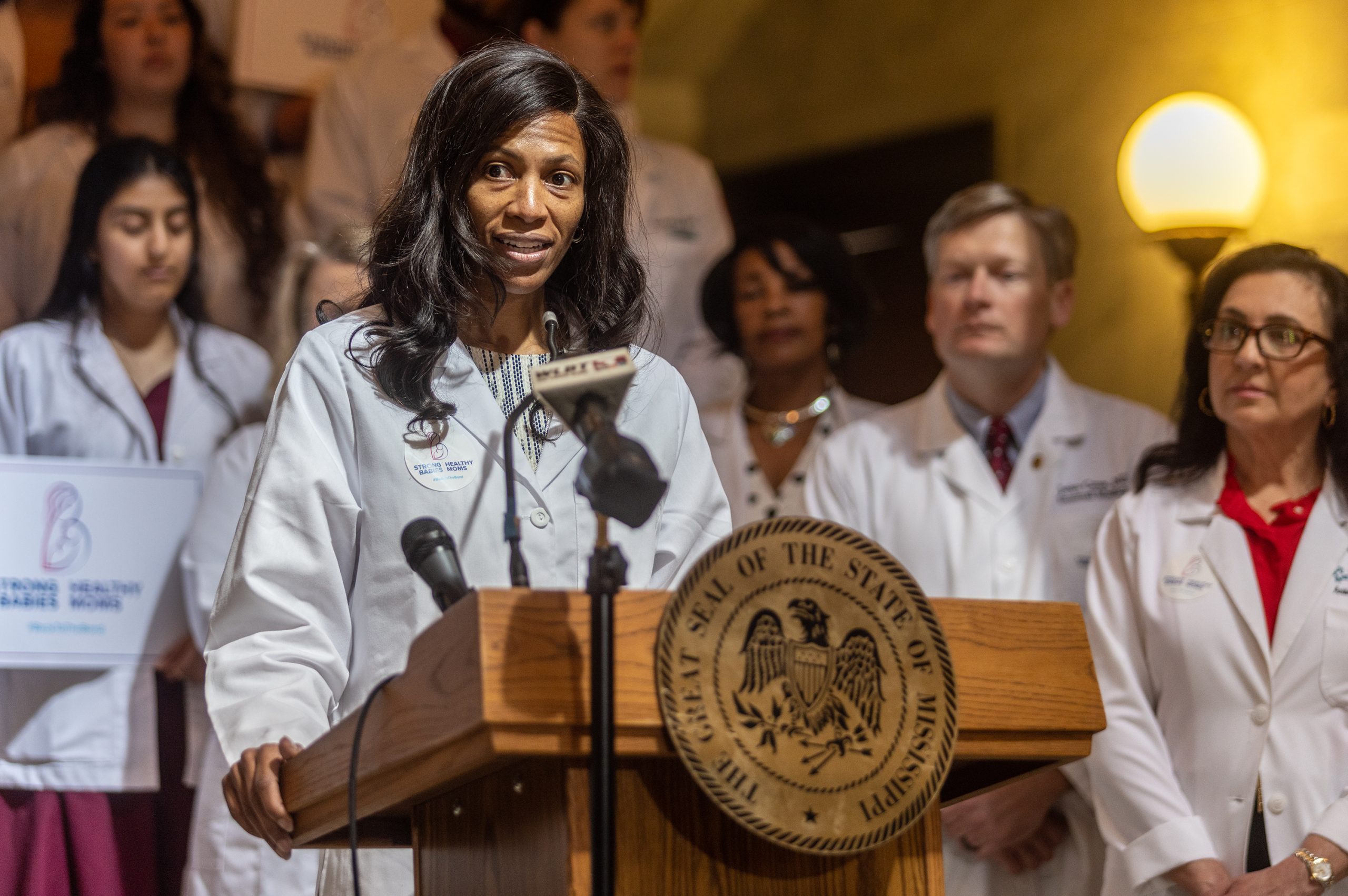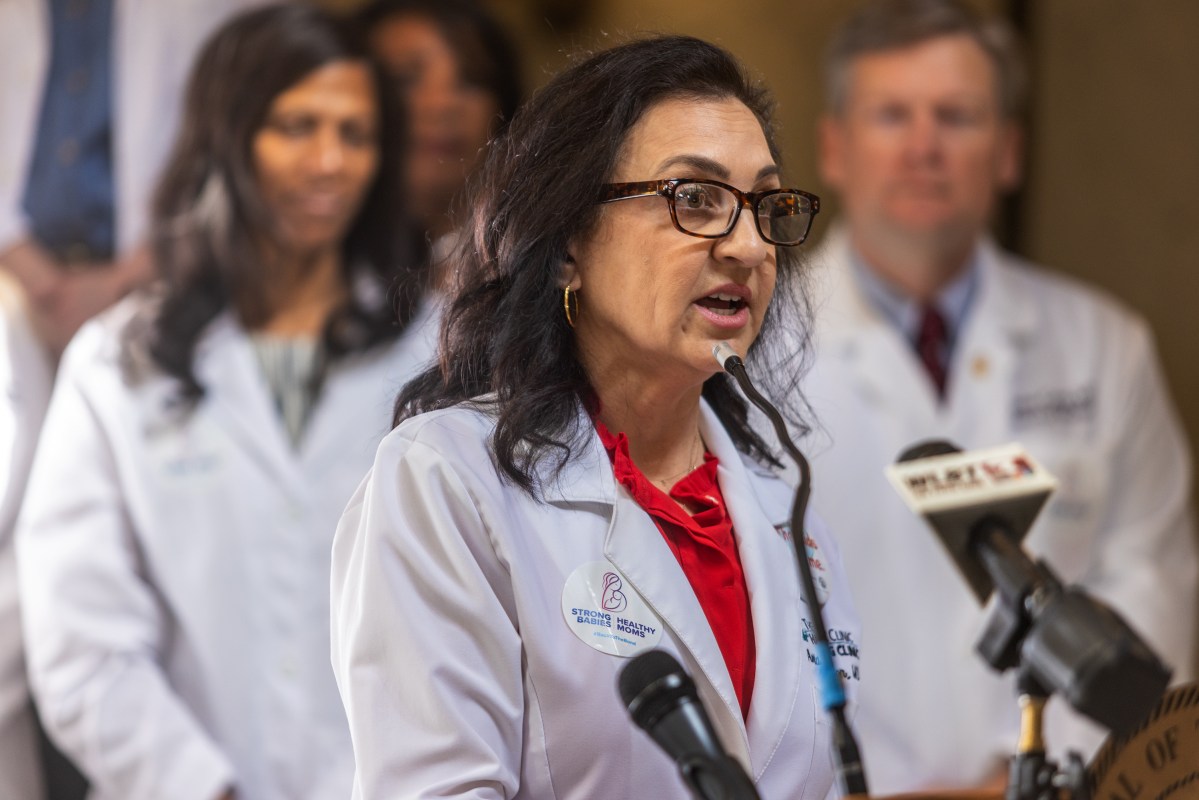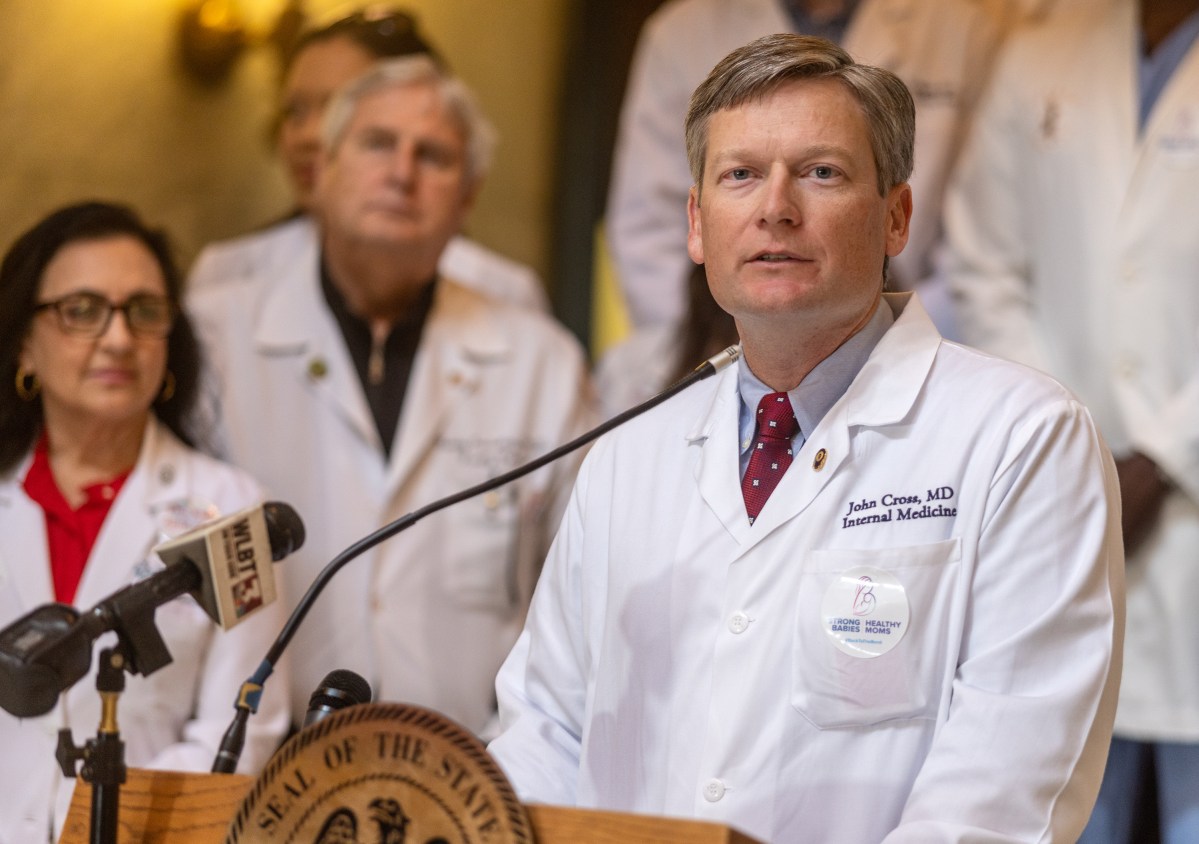Mississippi Today
‘Mississippi moms can’t wait.’ Doctors urge legislators to extend postpartum coverage

‘Mississippi moms can’t wait.’ Doctors urge legislators to extend postpartum coverage
Flanked by residents and student physicians from all over the state, Mississippi doctors and the Mississippi State Medical Association had one ask for Speaker of the House Phillip Gunn on Wednesday.
“We’re simply asking the speaker to allow (Senate Bill) 2212 to be brought for a vote,” said Dr. Anita Henderson, a pediatrician from Hattiesburg.
Last year, Gunn killed the legislation before it could be brought to a vote on the House floor. He has been noncommittal as to whether he will allow his chamber to vote on it this session.
In a press conference hosted on the second floor of the Capitol, Mississippi doctors emphasized the importance of extending postpartum care in the state and at times spoke directly to the House, asking them to pass SB 2212 to extend Medicaid postpartum coverage from 60 days to 12 months.
According to a Mississippi Today poll of House lawmakers conducted this session, a majority support extending the health insurance coverage for moms on Medicaid.
Currently, Mississippi women who have Medicaid have health insurance coverage for two months after giving birth. But many women in Mississippi and other states who have not expanded Medicaid lose coverage after that, despite complications associated with recovering from pregnancy continuing past that point.
Wyoming’s Senate and Utah’s House are currently considering similar legislation. Mississippi and Wyoming are the only two states with neither extended postpartum coverage nor expanded Medicaid.
“I know that those moms are suffering, and I know that those babies are likely to suffer as well,” Henderson said. “Babies need their mothers, and their mothers need health care.”

SB 2212 was passed by the full Senate on Feb. 7. It’s the second time in four years the Republican-led Senate has voted in favor of extending postpartum care.
The bill now goes to the House, where Speaker Phillip Gunn’s office will likely assign it to the House Medicaid Committee.
In spite of urging from health professionals for years, state leaders like Gov. Tate Reeves and Gunn have remained steadfast in their opposition.
Gunn has repeatedly referred to the bill as Medicaid expansion, another hotly contested Mississippi legislative issue. He indicated to WAPT on Wednesday he would not allow the bill to come up for a vote for that reason.
But the bill doesn’t expand Medicaid eligibility —it extends coverage for those already on Medicaid. Gunn has also said that he’s waiting on the state Division of Medicaid to take a stance on the issue, which they’ve refused.
“It’s really not a right versus left issue,” Henderson said. “It’s a right versus wrong issue.”
Reeves last week said he needs more data to support that the legislation will help mothers.
Donning a button that said “The Kids Sent Me,” Henderson presented lots of data on Thursday: Two-thirds of babies born in Mississippi are born to mothers on Medicaid, and the state’s already-dismal maternal mortality rate is worsening. Mississippi has the highest infant mortality rate, preterm birth rate and low birthweight rate in the country.
Things are only set to get worse: The state’s neonatal ICUs and labor and delivery units are closing. With the U.S. Supreme Court’s decision to overturn abortion rights last summer, the state is expecting thousands more births.
And when a baby is born prematurely, it can cost the state more than half a million dollars more.
Every medical organization and the state economic council supports the extension of postpartum care for a reason, Henderson said.

“Children are 25% of our population, but 100% of our future,” Henderson said. “What I’m here to tell you is the future of Mississippi is being born right now … and if we want Mississippi to look differently in 10 years, in 20 years, we need to address maternal mortality, and we need to tackle the problem of prematurity.”
Dr. Michelle Owens, an OB-GYN board-certified in maternal fetal medicine, said the situation is dire.
“The process of transitioning back to a non-pregnant state is not arbitrarily cut off at 60 days, or at two months,” Owens said. “It takes almost a year to have a baby. It takes almost a year to get back.”
Henderson said she frequently sees mothers who are suffering from postnatal conditions like postpartum depression, hypertension and cardiomyopathy long after they give birth.
When she screens new mothers and they present complications after 60 days, there’s not much she can do.
Owens said the extension of coverage has the potential to be “transformative.”
“Mississippi moms can’t wait, and Mississippi has waited long enough,” she said.
This article first appeared on Mississippi Today and is republished here under a Creative Commons license.
Mississippi Today
1964: Mississippi Freedom Democratic Party was formed
April 26, 1964

Civil rights activists started the Mississippi Freedom Democratic Party to challenge the state’s all-white regular delegation to the Democratic National Convention.
The regulars had already adopted this resolution: “We oppose, condemn and deplore the Civil Rights Act of 1964 … We believe in separation of the races in all phases of our society. It is our belief that the separation of the races is necessary for the peace and tranquility of all the people of Mississippi, and the continuing good relationship which has existed over the years.”
In reality, Black Mississippians had been victims of intimidation, harassment and violence for daring to try and vote as well as laws passed to disenfranchise them. As a result, by 1964, only 6% of Black Mississippians were permitted to vote. A year earlier, activists had run a mock election in which thousands of Black Mississippians showed they would vote if given an opportunity.
In August 1964, the Freedom Party decided to challenge the all-white delegation, saying they had been illegally elected in a segregated process and had no intention of supporting President Lyndon B. Johnson in the November election.
The prediction proved true, with white Mississippi Democrats overwhelmingly supporting Republican candidate Barry Goldwater, who opposed the Civil Rights Act. While the activists fell short of replacing the regulars, their courageous stand led to changes in both parties.
This article first appeared on Mississippi Today and is republished here under a Creative Commons Attribution-NoDerivatives 4.0 International License.![]()
Mississippi Today
Mississippi River flooding Vicksburg, expected to crest on Monday
Warren County Emergency Management Director John Elfer said Friday floodwaters from the Mississippi River, which have reached homes in and around Vicksburg, will likely persist until early May. Elfer estimated there areabout 15 to 20 roads underwater in the area.
“We’re about half a foot (on the river gauge) from a major flood,” he said. “But we don’t think it’s going to be like in 2011, so we can kind of manage this.”
The National Weather projects the river to crest at 49.5 feet on Monday, making it the highest peak at the Vicksburg gauge since 2020. Elfer said some residents in north Vicksburg — including at the Ford Subdivision as well as near Chickasaw Road and Hutson Street — are having to take boats to get home, adding that those who live on the unprotected side of the levee are generally prepared for flooding.



“There are a few (inundated homes), but we’ve mitigated a lot of them,” he said. “Some of the structures have been torn down or raised. There are a few people that still live on the wet side of the levee, but they kind of know what to expect. So we’re not too concerned with that.”
The river first reached flood stage in the city — 43 feet — on April 14. State officials closed Highway 465, which connects the Eagle Lake community just north of Vicksburg to Highway 61, last Friday.

Elfer said the areas impacted are mostly residential and he didn’t believe any businesses have been affected, emphasizing that downtown Vicksburg is still safe for visitors. He said Warren County has worked with the U.S. Army Corps of Engineers and the Mississippi Emergency Management Agency to secure pumps and barriers.
“Everybody thus far has been very cooperative,” he said. “We continue to tell people stay out of the flood areas, don’t drive around barricades and don’t drive around road close signs. Not only is it illegal, it’s dangerous.”
NWS projects the river to stay at flood stage in Vicksburg until May 6. The river reached its record crest of 57.1 feet in 2011.




This article first appeared on Mississippi Today and is republished here under a Creative Commons Attribution-NoDerivatives 4.0 International License.![]()
Mississippi Today
With domestic violence law, victims ‘will be a number with a purpose,’ mother says
Joslin Napier. Carlos Collins. Bailey Mae Reed.
They are among Mississippi domestic violence homicide victims whose family members carried their photos as the governor signed a bill that will establish a board to study such deaths and how to prevent them.
Tara Gandy, who lost her daughter Napier in Waynesboro in 2022, said it’s a moment she plans to tell her 5-year-old grandson about when he is old enough. Napier’s presence, in spirit, at the bill signing can be another way for her grandson to feel proud of his mother.
“(The board) will allow for my daughter and those who have already lost their lives to domestic violence … to no longer be just a number,” Gandy said. “They will be a number with a purpose.”
Family members at the April 15 private bill signing included Ashla Hudson, whose son Collins, died last year in Jackson. Grandparents Mary and Charles Reed and brother Colby Kernell attended the event in honor of Bailey Mae Reed, who died in Oxford in 2023.
Joining them were staff and board members from the Mississippi Coalition Against Domestic Violence, the statewide group that supports shelters and advocated for the passage of Senate Bill 2886 to form a Domestic Violence Facility Review Board.
The law will go into effect July 1, and the coalition hopes to partner with elected officials who will make recommendations for members to serve on the board. The coalition wants to see appointees who have frontline experience with domestic violence survivors, said Luis Montgomery, public policy specialist for the coalition.
A spokesperson from Gov. Tate Reeves’ office did not respond to a request for comment Friday.
Establishment of the board would make Mississippi the 45th state to review domestic violence fatalities.
Montgomery has worked on passing a review board bill since December 2023. After an unsuccessful effort in 2024, the coalition worked to build support and educate people about the need for such a board.
In the recent legislative session, there were House and Senate versions of the bill that unanimously passed their respective chambers. Authors of the bills are from both political parties.
The review board is tasked with reviewing a variety of documents to learn about the lead up and circumstances in which people died in domestic violence-related fatalities, near fatalities and suicides – records that can include police records, court documents, medical records and more.
From each review, trends will emerge and that information can be used for the board to make recommendations to lawmakers about how to prevent domestic violence deaths.
“This is coming at a really great time because we can really get proactive,” Montgomery said.
Without a board and data collection, advocates say it is difficult to know how many people have died or been injured in domestic-violence related incidents.
A Mississippi Today analysis found at least 300 people, including victims, abusers and collateral victims, died from domestic violence between 2020 and 2024. That analysis came from reviewing local news stories, the Gun Violence Archive, the National Gun Violence Memorial, law enforcement reports and court documents.
Some recent cases the board could review are the deaths of Collins, Napier and Reed.
In court records, prosecutors wrote that Napier, 24, faced increased violence after ending a relationship with Chance Fabian Jones. She took action, including purchasing a firearm and filing for a protective order against Jones.
Jones’s trial is set for May 12 in Wayne County. His indictment for capital murder came on the first anniversary of her death, according to court records.
Collins, 25, worked as a nurse and was from Yazoo City. His ex-boyfriend Marcus Johnson has been indicted for capital murder and shooting into Collins’ apartment. Family members say Collins had filed several restraining orders against Johnson.
Johnson was denied bond and remains in jail. His trial is scheduled for July 28 in Hinds County.
He was a Jackson police officer for eight months in 2013. Johnson was separated from the department pending disciplinary action leading up to immediate termination, but he resigned before he was fired, Jackson police confirmed to local media.
Reed, 21, was born and raised in Michigan and moved to Water Valley to live with her grandparents and help care for her cousin, according to her obituary.
Kylan Jacques Phillips was charged with first degree murder for beating Reed, according to court records. In February, the court ordered him to undergo a mental evaluation to determine if he is competent to stand trial, according to court documents.
At the bill signing, Gandy said it was bittersweet and an honor to meet the families of other domestic violence homicide victims.
“We were there knowing we are not alone, we can travel this road together and hopefully find ways to prevent and bring more awareness about domestic violence,” she said.
This article first appeared on Mississippi Today and is republished here under a Creative Commons Attribution-NoDerivatives 4.0 International License.
-

 News from the South - Florida News Feed6 days ago
News from the South - Florida News Feed6 days agoJim talks with Rep. Robert Andrade about his investigation into the Hope Florida Foundation
-

 News from the South - Alabama News Feed5 days ago
News from the South - Alabama News Feed5 days agoPrayer Vigil Held for Ronald Dumas Jr., Family Continues to Pray for His Return | April 21, 2025 | N
-

 Mississippi Today6 days ago
Mississippi Today6 days ago‘Trainwreck on the horizon’: The costly pains of Mississippi’s small water and sewer systems
-

 News from the South - Florida News Feed5 days ago
News from the South - Florida News Feed5 days agoTrump touts manufacturing while undercutting state efforts to help factories
-

 News from the South - Texas News Feed5 days ago
News from the South - Texas News Feed5 days agoMeteorologist Chita Craft is tracking a Severe Thunderstorm Warning that's in effect now
-

 News from the South - Virginia News Feed5 days ago
News from the South - Virginia News Feed5 days agoTaking video of military bases using drones could be outlawed | Virginia
-

 News from the South - Florida News Feed5 days ago
News from the South - Florida News Feed5 days agoFederal report due on Lumbee Tribe of North Carolina’s path to recognition as a tribal nation
-

 News from the South - Oklahoma News Feed5 days ago
News from the South - Oklahoma News Feed5 days agoOklahoma Treasurer’s Office Faces Scrutiny Over Use of Signal in Anti-ESG Coordination














































